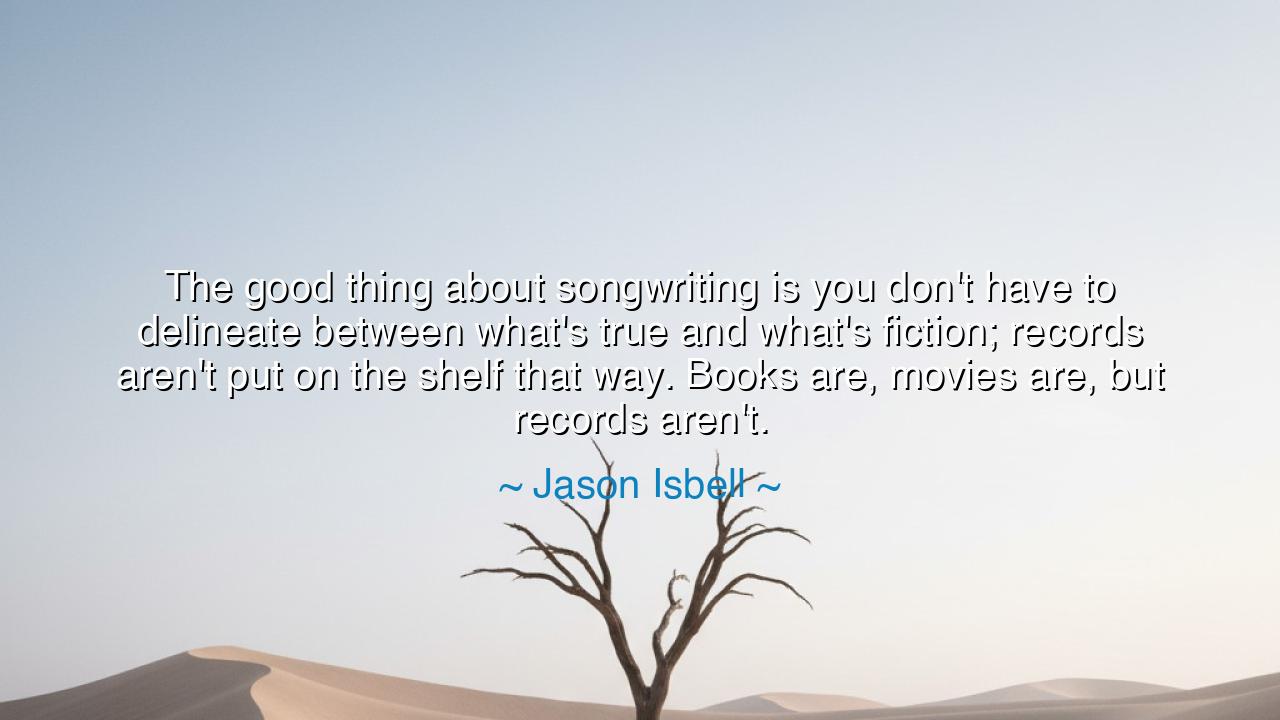
The good thing about songwriting is you don't have to delineate
The good thing about songwriting is you don't have to delineate between what's true and what's fiction; records aren't put on the shelf that way. Books are, movies are, but records aren't.






In the ancient world, stories were passed down not with the rigid constraints of facts and truths, but with a freedom that allowed for both the real and the imagined to intertwine. In the words of Jason Isbell, we find a reflection of this very spirit: "The good thing about songwriting is you don't have to delineate between what's true and what's fiction; records aren't put on the shelf that way. Books are, movies are, but records aren't." These words capture the very essence of the art of songwriting—a form of expression that is not confined to the realities of the world but is free to explore both the truth of human experience and the boundless imagination that resides within us all.
The ancient epic poems, like Homer's Iliad and Odyssey, were not bound by the need for literal truth. They blended the real and the mythical, creating worlds where gods walked among men and where heroes were shaped not just by their physical strength, but by their fate. These stories were not meant to be historical records, but vehicles for the human spirit—stories that spoke to universal truths, not of individual events, but of the essence of life. Just as these ancient poets could mix fact and fiction freely, so too does Isbell speak to the freedom of songwriting, where the emotional truth of a song can exist without the need for literal accuracy.
In the ancient world, the greatest artists and storytellers did not concern themselves with the burden of factual accuracy. Take, for example, the great Greek tragedians—Sophocles, Euripides, and Aeschylus—who created theatrical works not based on historical events, but on the universal themes of human experience. These dramas were not designed to record the past but to examine the very nature of human existence, from love to betrayal, from honor to suffering. They understood that the truth of the human soul could not be captured by mere facts; it required the imaginative power to explore the full range of human emotion, myth, and mystery. Isbell’s words echo this tradition, reminding us that the true power of a song is in its ability to touch the heart and soul, not necessarily to mirror the factual world.
The freedom Isbell speaks of in songwriting is a gift that allows the artist to transcend the limitations of reality. Music, unlike books or films, does not demand the same clear distinction between fact and fiction. A song can blend personal experience with storytelling, creating a space where the listener is invited to experience the emotion of the song rather than focus on the exact details of its origin. Consider the great ballads of the past—tales of love, loss, and adventure that may not have been entirely true, but resonated with the truths of the human experience. These songs were not confined to the strictures of history but lived on through their emotional power and universal themes.
This notion of freedom in art allows the creator to speak not only of personal experiences, but to evoke something much larger—something that connects all listeners to the shared human condition. For instance, in William Shakespeare’s plays, we see this blend of fact and fiction. He took the lives of kings, queens, and commoners, blending historical figures with imagined plots, yet it was not the literal truth that made his plays resonate; it was the human truths embedded in his stories—ambition, love, revenge, and betrayal. Shakespeare understood that the true power of storytelling lies not in its factual accuracy, but in its ability to speak to the soul.
The lesson we glean from Isbell’s wisdom is clear: art is not bound by the constraints of reality; it is a vehicle for truth, but a truth that transcends the factual and enters the realm of the emotional, the universal, and the eternal. As creators, we are not tasked with documenting the world as it is, but with expressing the world as it feels. Our songs, stories, and works of art are not just reflections of the world around us, but are windows into the human spirit—a spirit that moves, that dreams, and that yearns for something greater than what is seen with the eye. Just as the ancient poets found the freedom to weave truth and fiction into their work, so must we embrace the freedom to explore the depths of human experience, even if it means stepping beyond the boundaries of the literal world.
In your own life, remember that the truth you seek may not always be found in the facts, but in the deeper emotional realities that shape us. Whether you are an artist, a storyteller, or a philosopher, embrace the freedom that comes from moving beyond the literal, from creating something that captures the essence of what it means to be human. Like Isbell in his songwriting or Shakespeare in his plays, you too have the power to tell a truth that resonates deeply with the soul—not because it is factually correct, but because it touches something universal and eternal within us all.






AAdministratorAdministrator
Welcome, honored guests. Please leave a comment, we will respond soon